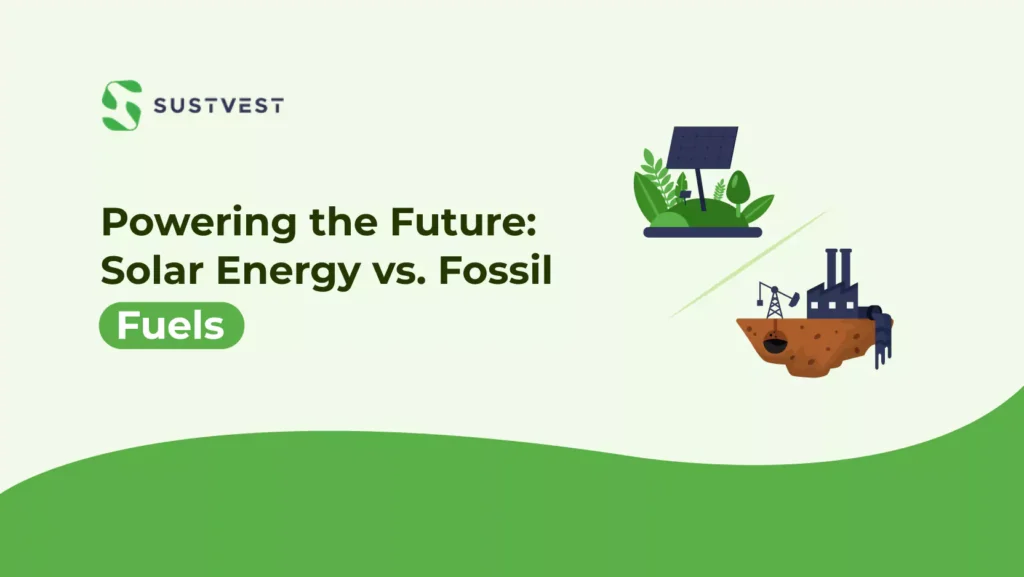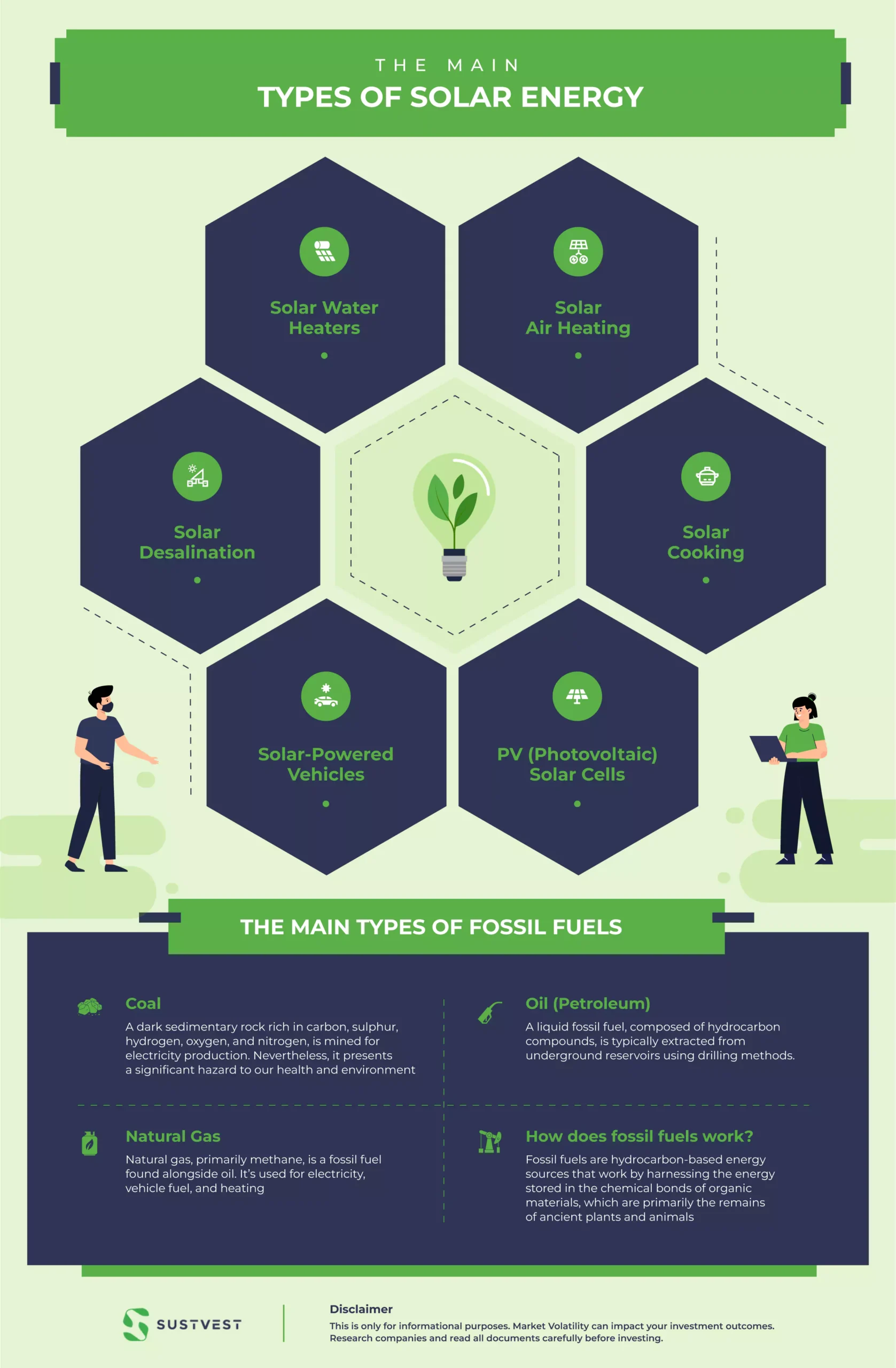Introduction:
A sustainable and eco-friendly future, a sustained fight between solar energy and fossil fuels has become a defining descriptive. As the world keenly competes with the urgent need to address climate change and transition to cleaner energy sources, this comparison takes center stage. In this exploration, Sustvest will delve into the key aspects of powering solar energy vs. fossil fuels, examining their impact on the environment, economics, and global energy landscape.

What is Solar Energy?
Solar energy is a renewable and sustainable source of power derived from the sun’s radiation. It is harnessed using various technologies, (PV) cells or solar panels, to convert sunlight into electricity. Solar energy can also be used for heating and cooling applications through solar thermal systems. “How to Make a Solar Investment” and be more sustainable?
What are Fossil Fuels?
Fossil fuels are hydrocarbon-based energy resources formed from dead plant and animal remains over millions of years. They have been the dominant energy sources for industry and transportation, vital to human development.
The main Types of Solar Energy:
Solar Thermal Systems:
Solar thermal systems use sunlight to heat, usually water or a heat transfer fluid to generate heat. This heat can then be used for various purposes, including space heating, water heating, and electricity generation through steam turbines. Here are two types of solar thermal systems:
- Flat-Plate Collectors: These systems use flat, dark-colored plates to absorb and transfer heat to a fluid.
- Concentrated Solar Power (CSP): These systems use mirrors or lenses to concentrate sunlight onto a smaller area, generating high-temperature heat that drives a turbine to produce electricity.
Solar Water Heaters:
Solar water heaters use sunlight to heat water for domestic or industrial use. They consist of collectors, often mounted on rooftops, that absorb sunlight and transfer the heat to water in a storage tank.
Solar Air Heating:
Solar air heating systems capture sunlight to heat air, which can then be circulated and used for space heating or industrial processes.
Solar Desalination:
These systems use solar energy to desalinate seawater or brackish water, making it suitable for drinking or irrigation.
Solar Cooking:
Solar ovens and cookers use sunlight energy to cook food without the need for traditional fuels like wood or gas. They are especially useful in regions with abundant sunlight and limited access to cooking fuel.
Solar-Powered Vehicles:
solar panels in a wide range of vehicles, like cars, boats, and airplanes, represent more than just technological progress; they signify a significant stride toward a more sustainable and efficient future. This innovative approach enhances the performance of electric vehicles and reduces our reliance on fossil fuels.
PV (Photovoltaic) Solar Cells:
PV cells, often referred to as solar panels, represent the most recognized and extensively adopted solar energy technology. These cells directly transform sunlight into electricity. When sunlight’s photons interact with PV cells, they generate an electrical current. This electrical power can be employed instantly or stored in batteries for future utilization.

The main Types of Fossil Fuels:
Coal:
A dark sedimentary rock rich in carbon, sulphur, hydrogen, oxygen, and nitrogen, is mined for electricity production. Nevertheless, it presents a significant hazard to our health and environment. It emits CO2 and creates air pollution, jeopardizing human well-being and the delicate ecological equilibrium of our planet.
Oil (Petroleum):
A liquid fossil fuel, composed of hydrocarbon compounds, is typically extracted from underground reservoirs using drilling methods. This substance serves as a crucial ingredient in producing petrol, diesel, jet fuel, and various other derived products. Its versatility as an energy source is highly prized, yet it also contributes significantly to greenhouse gas emissions, raising important ethical questions.
Natural Gas:
Natural gas, primarily methane, is a fossil fuel found alongside oil. It’s used for electricity, vehicle fuel, and heating. Cleaner than coal and oil, it still emits CO2 and methane when burned. Balancing energy needs with environmental impact is crucial to human values.
How does fossil fuels work?
Fossil fuels are hydrocarbon-based energy sources that work by harnessing the energy stored in the chemical bonds of organic materials, which are primarily the remains of ancient plants and animals. They are used for various energy applications.
Will solar power energy exhausted with its extensive use?
Solar power energy, as derived from the sun, will not exhaust with its extensive use. The sun is a virtually abundant limitless source of energy. It is estimated that the sun radiates a tearing amount of energy toward Earth, and humanity’s current and foreseeable use of solar power represents only a tiny fraction of this total energy resource.
Here are some key reasons why solar energy will not run out:
Renewable Nature:
Solar energy depends on the sun. That will keep emitting energy for billions of years. Unlike limited fossil fuels like coal, oil, and natural gas, the sun’s energy is practically endless.
Continuous Energy Source:
Solar power is available as long as the sun is shining, which happens every day. Although generating energy at night requires energy storage solutions like batteries, we can count on the sun rising again, bringing a new source of energy with each new day.
Vast Energy Potential:
The sunlight that reaches Earth’s surface holds the potential to fulfill our planet’s energy requirements for an entire year. This vast energy resource greatly surpasses our current and future energy demands.
Technological Advancements:
Ongoing breakthroughs in solar tech, energy storage, and efficiency are driving cost-effective solar energy, aligning with our sustainable energy goals.
Is solar power more environmentally friendly than fossil fuels?
Yes, solar power is generally considered to be much more environmentally friendly than fossil fuels.
Here are some key reasons why:
Air Quality Improvement:
Solar power is environmentally friendly, emitting no harmful air pollutants like sulfur dioxide, nitrogen oxides, or particulate matter. This benefits air quality and human health. In contrast, fossil fuel combustion, notably in power plants and vehicles, continues to be a major source of these pollutants.
Water Conservation:
Solar power generation typically requires very little water, whereas many fossil fuel power plants, such as coal and natural gas facilities, consume large amounts of water for cooling purposes. This can strain local water resources and harm aquatic ecosystems.
Reduced Greenhouse Gas Emissions:
Solar power’s emissions-free electricity production contributes to a healthier planet by mitigating global warming and environmental challenges. In contrast, fossil fuels release harmful pollutants, degrading human well-being and the environment.
Resource Sustainability:
Solar energy harnesses the power of sunlight, an abundant and renewable source. In contrast, fossil fuels are limited and can be exhausted, lacking the ability to regenerate naturally.
Reduced Land Disruption:
Solar power installations, such as solar farms or rooftop solar panels, have a smaller environmental footprint compared to fossil fuel extraction and mining operations
FAQs: Solar energy vs. Fossil Fuels
Q.1 Can solar energy effectively replace fossil fuels?
A1: Solar energy holds great promise and is progressively becoming a viable alternative to fossil fuels. Advancements in technology are driving down costs and expanding its potential.
Q.2 What are the environmental benefits of choosing solar energy over fossil fuels?
A2: By choosing solar energy, we make a significant impact on our environment. It allows us to generate electricity without emitting harmful greenhouse gases or air pollutants, ultimately improving air quality and actively combatting climate change.
Q.3 Can solar energy provide energy consistently, day and night?
A3: Solar energy generation relies on sunlight, making it unavailable at night. Nevertheless, the integration of energy storage solutions such as batteries allows for the capture of surplus energy produced during the day, ensuring a continuous energy supply even during nighttime or overcast conditions.
Q.4 How does the cost of solar energy compared to fossil fuels?
A4: The cost of solar energy has been steadily decreasing, aligning with our commitment to affordability and sustainability
Q.5 Can fossil fuels be made more environmentally friendly?
A5: Efforts are being made to develop technologies that promote cleaner fossil fuel use and reduce emissions, reflecting our dedication to a greener future.
Conclusion:
In Powering the Future of Solar Energy vs. Fossil Fuels, the comparison underscores a pivotal choice for our energy future. As we stand at the crossroads of addressing climate change, environmental degradation, and the need for sustainable energy sources, it becomes abundantly clear that solar energy emerges as a transformative and responsible solution. Learn more articles on this in Sustvest.

Founder of Sustvest
Hardik completed his B.Tech from BITS Pilani. Keeping the current global scenario, the growth of renewable energy in mind, and people looking for investment opportunities in mind he founded SustVest ( formerly, Solar Grid X ) in 2018. This venture led him to achieve the ‘Emerging Fintech Talent of the Year in MENA region ‘ in October 2019.




